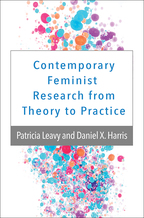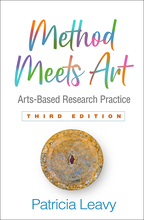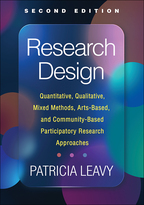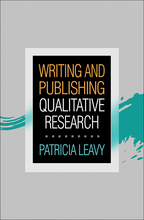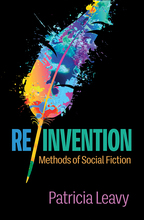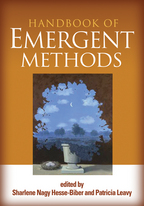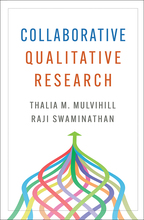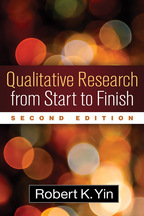Contemporary Feminist Research from Theory to Practice
Patricia Leavy and Daniel X. Harris
HardcoverPaperbacke-bookprint + e-book
Hardcover
orderAugust 9, 2018
ISBN 9781462536283
Price: $74.00 302 Pages
Size: 6⅛" x 9¼"
Paperback
orderAugust 13, 2018
ISBN 9781462520251
Price: $49.00302 Pages
Size: 6⅛" x 9¼"
Read a Q&A with featured author, Patricia Leavy!
Sign up for emails on upcoming titles by Patricia Leavy (with special discounts)!
Sign up for emails on upcoming titles by Patricia Leavy (with special discounts)!
“Dr. Patricia Leavy and Dr. Anne Harris…offer learners of all career stages a concise and lively blueprint for bringing feminism out of the realm of theory and into that of application. The authors orient readers to feminism as a dynamic, continuously evolving culture of inclusion and affirmation. This philosophy pervades the text from start to finish, operationalized by engaging discussion questions and hands-on practice activities….Throughout the book, the authors weave in timely examples that illustrate different intersectionalities within feminist research practice. This attention to the immense diversity of what feminist research can mean across different communities and contexts makes the book both exciting and relatable. I also found the authors’ explicit intent for different chapters within the book to stand alone if needed both cleverly conceived and well executed….Offers tremendous flexibility as a learning resource for courses ranging from the very conceptual to the very applied. I recommend it strongly for a wide variety of learner demographics and teaching activities within and beyond qualitative methods. Likewise, this textbook offers wonderful support for both seasoned feminist scholars and those just beginning to discover what feminism means for them.”

—The Qualitative Report
“This excellent introduction to feminist research is accessible to both undergraduates and graduate students. Students in my Feminist Research Methodologies course found the content and structure of the book very helpful in writing a clearly argued and defendable research proposal. I recommend this book to any methods instructor who has a commitment to anti-oppressive research and social justice. It may be easily incorporated into the required readings of courses in education; anthropology; ethnic studies; sociology; and feminist, women's, and gender and sexuality studies.”

—Manal Hamzeh, PhD, Department of Interdisciplinary and Gender and Sexuality Studies, New Mexico State University
“This is the new go-to text for feminist researchers at any stage. More than just a handbook, Contemporary Feminist Research from Theory to Practice provides an in-depth consideration of feminist theories, research, and activism, paying close attention to racial, geopolitical, and gender diversities, linkages, and controversies. Students will benefit tremendously from the expansive multimedia and multidisciplinary resources offered in each chapter, as well as the thoughtful discussion questions and activities and clearly defined terms. The book makes a unique contribution to the feminist classroom with its multidisciplinary focus; elegantly interwoven history of feminisms; and strong, accessible articulation of the dynamic and interconnected nature of feminist theory, research, and practice from a variety of perspectives.”

—Barbara Gurr, PhD, Women’s, Gender, and Sexuality Studies Program, University of Connecticut
“This engaging guide to feminist research in all its diversity is wonderfully readable and useful. The clear writing, with remarkably little jargon, achieves accessibility without oversimplifying important concepts, such as intersectionality and nonbinary genders. The book is unique in embedding feminist research within both theory and activism while offering practical guidance for producing and disseminating it. The focus on how to be a feminist on the digital highway provides insights into the potential of digital and social media for social justice. Each chapter’s discussion questions, suggested activities, and digital and nondigital resources will stimulate student learning. Somehow the book works for all levels—undergraduates, graduate students, and instructors.”

—Patricia H. Miller, PhD, Department of Psychology, San Francisco State University
“A major strength of this book is that it showcases a variety of ways of presenting feminist research. The book will be useful for those instructors interested in teaching feminist research with actual case examples. The discussion questions, text boxes, and additional resources are very useful, moving us from theory to application. This text exemplifies creative writing and teaching.”

—Venus E. Evans-Winters, PhD, Department of Educational Administration and Foundations, Illinois State University
“Many texts on quantitative methods—and some on qualitative methods—frame social research as a neutral, apolitical practice. Yet, for me, such an assumption is irresponsible and dangerous. By merging critical feminist theory and research methods, this exciting book demonstrates how and why social research is political. I especially appreciate the extensive discussions of collaboration, embodiment, and intersectionality, as well as the chapters on feminist ethics, publishing feminist research, and doing public scholarship. As one of the most inclusive texts on the market, this book is an essential resource for new and advanced scholars.”

—Tony E. Adams, PhD, Department of Communication, Bradley University
“I have been teaching methods for 25 years, and this text far surpasses any I have used in the past. It is incredibly comprehensive, providing an overview of feminist theory as well as the directions needed to choose and employ various methods.”

—Angela J. Hattery, PhD, Professor and Director, Women and Gender Studies Program, George Mason University
“A good introduction to feminist research methodology that grounds the reader in history and theory and then moves to actual research practice, thoroughly covering the types of research that feminists are doing today. I appreciate the inclusion of contemporary digital practices, which are very important currently.”

—Stacie Craft DeFreitas, PhD, Department of Social Sciences, University of Houston–Downtown
“There is no feminist research textbook I know of that is as timely and on point as this one. The complexity of the field of feminist scholarship is well articulated, the examples are relevant to my undergraduate students, and the exercises are thoughtful and engaging.”

—Kate McCoy, PhD, Department of Educational Studies and Leadership and Department of Women’s, Gender, and Sexuality Studies, State University of New York at New Paltz
—The Qualitative Report
“This excellent introduction to feminist research is accessible to both undergraduates and graduate students. Students in my Feminist Research Methodologies course found the content and structure of the book very helpful in writing a clearly argued and defendable research proposal. I recommend this book to any methods instructor who has a commitment to anti-oppressive research and social justice. It may be easily incorporated into the required readings of courses in education; anthropology; ethnic studies; sociology; and feminist, women's, and gender and sexuality studies.”
—Manal Hamzeh, PhD, Department of Interdisciplinary and Gender and Sexuality Studies, New Mexico State University
“This is the new go-to text for feminist researchers at any stage. More than just a handbook, Contemporary Feminist Research from Theory to Practice provides an in-depth consideration of feminist theories, research, and activism, paying close attention to racial, geopolitical, and gender diversities, linkages, and controversies. Students will benefit tremendously from the expansive multimedia and multidisciplinary resources offered in each chapter, as well as the thoughtful discussion questions and activities and clearly defined terms. The book makes a unique contribution to the feminist classroom with its multidisciplinary focus; elegantly interwoven history of feminisms; and strong, accessible articulation of the dynamic and interconnected nature of feminist theory, research, and practice from a variety of perspectives.”
—Barbara Gurr, PhD, Women’s, Gender, and Sexuality Studies Program, University of Connecticut
“This engaging guide to feminist research in all its diversity is wonderfully readable and useful. The clear writing, with remarkably little jargon, achieves accessibility without oversimplifying important concepts, such as intersectionality and nonbinary genders. The book is unique in embedding feminist research within both theory and activism while offering practical guidance for producing and disseminating it. The focus on how to be a feminist on the digital highway provides insights into the potential of digital and social media for social justice. Each chapter’s discussion questions, suggested activities, and digital and nondigital resources will stimulate student learning. Somehow the book works for all levels—undergraduates, graduate students, and instructors.”
—Patricia H. Miller, PhD, Department of Psychology, San Francisco State University
“A major strength of this book is that it showcases a variety of ways of presenting feminist research. The book will be useful for those instructors interested in teaching feminist research with actual case examples. The discussion questions, text boxes, and additional resources are very useful, moving us from theory to application. This text exemplifies creative writing and teaching.”
—Venus E. Evans-Winters, PhD, Department of Educational Administration and Foundations, Illinois State University
“Many texts on quantitative methods—and some on qualitative methods—frame social research as a neutral, apolitical practice. Yet, for me, such an assumption is irresponsible and dangerous. By merging critical feminist theory and research methods, this exciting book demonstrates how and why social research is political. I especially appreciate the extensive discussions of collaboration, embodiment, and intersectionality, as well as the chapters on feminist ethics, publishing feminist research, and doing public scholarship. As one of the most inclusive texts on the market, this book is an essential resource for new and advanced scholars.”
—Tony E. Adams, PhD, Department of Communication, Bradley University
“I have been teaching methods for 25 years, and this text far surpasses any I have used in the past. It is incredibly comprehensive, providing an overview of feminist theory as well as the directions needed to choose and employ various methods.”
—Angela J. Hattery, PhD, Professor and Director, Women and Gender Studies Program, George Mason University
“A good introduction to feminist research methodology that grounds the reader in history and theory and then moves to actual research practice, thoroughly covering the types of research that feminists are doing today. I appreciate the inclusion of contemporary digital practices, which are very important currently.”
—Stacie Craft DeFreitas, PhD, Department of Social Sciences, University of Houston–Downtown
“There is no feminist research textbook I know of that is as timely and on point as this one. The complexity of the field of feminist scholarship is well articulated, the examples are relevant to my undergraduate students, and the exercises are thoughtful and engaging.”
—Kate McCoy, PhD, Department of Educational Studies and Leadership and Department of Women’s, Gender, and Sexuality Studies, State University of New York at New Paltz

